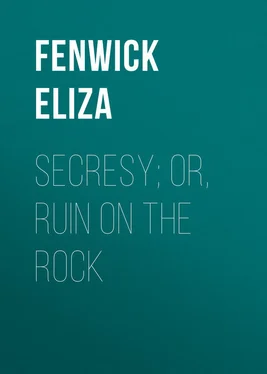Eliza Fenwick - Secresy; or, Ruin on the Rock
Здесь есть возможность читать онлайн «Eliza Fenwick - Secresy; or, Ruin on the Rock» — ознакомительный отрывок электронной книги совершенно бесплатно, а после прочтения отрывка купить полную версию. В некоторых случаях можно слушать аудио, скачать через торрент в формате fb2 и присутствует краткое содержание. Жанр: foreign_antique, foreign_prose, foreign_sf, на английском языке. Описание произведения, (предисловие) а так же отзывы посетителей доступны на портале библиотеки ЛибКат.
- Название:Secresy; or, Ruin on the Rock
- Автор:
- Жанр:
- Год:неизвестен
- ISBN:нет данных
- Рейтинг книги:3 / 5. Голосов: 1
-
Избранное:Добавить в избранное
- Отзывы:
-
Ваша оценка:
- 60
- 1
- 2
- 3
- 4
- 5
Secresy; or, Ruin on the Rock: краткое содержание, описание и аннотация
Предлагаем к чтению аннотацию, описание, краткое содержание или предисловие (зависит от того, что написал сам автор книги «Secresy; or, Ruin on the Rock»). Если вы не нашли необходимую информацию о книге — напишите в комментариях, мы постараемся отыскать её.
Secresy; or, Ruin on the Rock — читать онлайн ознакомительный отрывок
Ниже представлен текст книги, разбитый по страницам. Система сохранения места последней прочитанной страницы, позволяет с удобством читать онлайн бесплатно книгу «Secresy; or, Ruin on the Rock», без необходимости каждый раз заново искать на чём Вы остановились. Поставьте закладку, и сможете в любой момент перейти на страницу, на которой закончили чтение.
Интервал:
Закладка:
Your uncle, my Sibella, I perceive, intended you for your lover, and your lover for you. His project, then, was to place a second Adam and Eve in the garden of Eden. Well, Sibella, innocence remains with you. Your Eden will yet bloom; for, trust me, innocence and happiness cannot long be separated.
Why will that uncle of your's so strenuously uphold his mysterious reserve and silence? I long to ask him a million of questions; and he knows that I do, and he wishes that I should. It is not because he is altogether convinced of the wisdom and utility of his plans, that he does plan; it is, that he will oppose himself to general customs and general experience. It is singularity and not perfection that he is in search of; and, since experience formerly taught him, that even the renowned name of Valmont might mix undistinguished with a herd of less illustrious names, he now bravely resolves to enforce the wonder of his compeers, if he cannot claim their reverence.
Perhaps, with the flattering promises of success, he sometimes soothes the rancour of his solitude. And occasionally, indeed, his existence is remembered, and his whimsies are made the subject of ridicule, contempt, and laughter; but some novel circumstance, such as the gay Mrs. Ashburn's visit to his gloomy retirement, must call them into this remembrance, or the name of Mr. Valmont would rest as undisturbed as does, in every memory but his own, the deeds of his forefathers.
It is to my mother's excursion to Valmont castle, that I owe the felicity of calling you my friend, it is to her escape from thence, as she herself terms it, that I owe my knowledge of Mr. Valmont's history. Surrounded, on her arrival at the house of Sir Thomas Barlowe, by a crowd of visitors, as gay, profuse, and dissipated as herself, she hastens to communicate her joy at the agreeable change, and to inveigh against the morose Mr. Valmont and his insipid wife. A conversation ensued of some length for such a subject, during which I discovered that two of the party, the Earl of Ulson and Colonel Ridson were once the intimate companions of Mr. Valmont. The former of these gentlemen appeared eager to place his defects in the strongest point of view; while the latter, with less zeal, to be sure, but with a sweetness of temper infinitely endearing, was willing to smooth the rugged parts of Mr. Valmont's character, and to place a vice behind the glare of a virtue. By setting aside, to the best of my judgment, the Earl's exaggerations, and making also some allowance for the palliative temper of Colonel Ridson, I had succeeded in learning as much of Mr. Valmont's history as enables me to form some, and I believe no inaccurate estimate of his worth, abilities, and character.
Your grandfather, Sibella, a being quite as eccentric tho' less whimsical than your uncle, lived in the castle you now inhabit. Nor would he, of his own free will, have quitted that castle for heaven itself. Every stone of the building that had kept its station in times of turbulence and discord against the attack of an enemy was to him an idol. If he was thoughtful, it was in recalling the great deeds of his ancestors; if he was talkative, it was on the same theme; if he had wishes, they were that he had lived in those glorious days when fighting well was the most eminent of virtues, and a strong fortified castle and obedient vassals the most valuable of possessions.
As is the established practice in families of such renown and dignity, as that to which you, my friend, appertain, the first born son of your grandfather was the only hope, the only joy, the only object of the careful solitude of his anxious parents; while your father, coming into the world two years after his brother, was adored, flattered and spoiled by no creature but his nurse. Your uncle, I understand, received a stately kind of education within the castle walls; and your father, happier because of less consequence, passed his early years with other young men of fashion at school and at college.
Mr. Valmont was not a whit behind his father in his veneration for high birth, but he could not boast so unqualified a love of fruits of armour; nor did he think that civil war was the only time when a man could gather honours worthy of a distinguished name. No sooner was your uncle emancipated from the fetters of his minority, than he resolved to repair to court, where he expected to find only his equals, and those equals alive to and exact in the observance of all that haughty decorum, which Mr. Valmont deemed indispensably necessary to the well being of social institutions. Poor man! he feels himself lost in the motley multitude, sees his high-born pretensions to notice and deference pushed aside by individuals obscure in their origin, but renowned for artful intrigues, for bold perseverance, and dazzling success! Shocked at the contaminating mixture, he had fled back with precipitancy to his castle, but love detained him, for he had made an offering of his heart to a woman of rank and fashion. Nothing could be more unfortunate than this passion. Nothing further from congeniality than the minds and manners of Lady Margaret B – and Mr. Valmont: he, just risen, as it were, from the tomb of his progenitors, loaded with the punctilio of the last age, recoiling from the salute of every man who could not boast an unblemished pedigree, and lastly, and most worthily, possessing refined ideas of female delicacy, of honourable love, and of unchanging fidelity; and she, on the contrary, a graceful coquette, without an atom of real tenderness in her heart, and valuing her rank merely as it gave her opportunities of extending her conquest. Lady Margaret B – was highly diverted with Mr. Valmont's formalities; and, in spite of the torture her dissipated coquettish manners inflicted on him, she had sufficient power to make him the most ardent of her lovers. In fine, she rejected him, laughed at him, despised him.
I could not hear this anecdote, nor can I repeat it, without a sensation of pain, so strongly do I enter into the irritable feelings of your uncle, when, hitherto accustomed only to receive homage and obedience, he is at once foiled in his ambition by low born courtiers, and betrayed in his love by a high born jilt.
Mr. Valmont consulted no other guide than his passions; and instantly drew an angry and false picture of mankind. With such people as I have spoken of he could not associate; for their vices he abhorred; but his mind had not fortitude enough, had not comprehension enough, to cast aside his own prejudices; and, instead of attempting to reform mankind, he retires to rail at them; and carries with him the pride, selfishness, and love of power, in which all the vices of society originate.
Wrapped in the impenetrable selfishness of high birth, Mr. Valmont denies the possibility of eminent virtue existing without rank. Who shall presume to arraign his principles, to sit in judgment upon his actions, to teach him his duty? I stand, cries Mr. Valmont, within the sacred verge of nobility! Look on that coat of arms! I derive from the Normans! Wisdom in rags – keep off!
True: his ancestors conquered, that he should be wise! – Oh, cede to him the palm! Bind his brows with the laurel!
After a few months retirement, Mr. Valmont ventured once more into the heterogeneous multitude, in search of a wife: for, I suspect he found himself as ill qualified for solitude as society. Beside, he had formed the virtuous project of instructing a new race, to put the old world out of countenance.
I cannot but pause, to reflect upon your uncle's toils in search of his help mate. He must have a wife, whose pedigree his future sons might place beside his own; and he must have one, of a temperament and character opposite to that of lady Margaret B – ; and his good stars, his ill stars, or whatever else you please, led him to the feet of Mrs. Valmont.
Читать дальшеИнтервал:
Закладка:
Похожие книги на «Secresy; or, Ruin on the Rock»
Представляем Вашему вниманию похожие книги на «Secresy; or, Ruin on the Rock» списком для выбора. Мы отобрали схожую по названию и смыслу литературу в надежде предоставить читателям больше вариантов отыскать новые, интересные, ещё непрочитанные произведения.
Обсуждение, отзывы о книге «Secresy; or, Ruin on the Rock» и просто собственные мнения читателей. Оставьте ваши комментарии, напишите, что Вы думаете о произведении, его смысле или главных героях. Укажите что конкретно понравилось, а что нет, и почему Вы так считаете.












